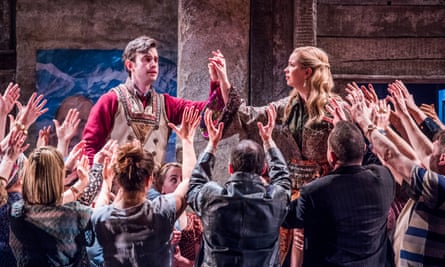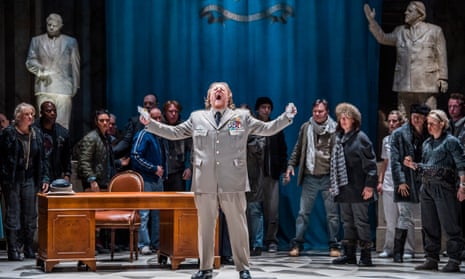Ryan Wigglesworth says he has been obsessed with Shakespeare’s late play for 20 years, and that made The Winter’s Tale the obvious choice of subject for his first opera. It’s the product of his four years as English National Opera’s composer-in-residence, and he conducted the premiere himself, in a production by Rory Kinnear, making his debut as a director.
The libretto comes directly from the play text; Wigglesworth has done the job himself, preserving the essence of the plot and dropping a few characters (most notably Autolycus) in the process. The result – three acts lasting just over two hours including one interval – is certainly taut enough, though at the same time some of the texture of the drama and the depth of its characterisations have gone. The score ought to compensate for that – that’s part of the point of turning any play into an opera – but for all the striking orchestral moments, I’m not sure it ever really does, even though the dramatic grip tightens the longer it goes on.
The first act in Sicilia deals with terrible things – Leontes’ mounting, unreasoning jealousy, the death of his son and the apparent death of Hermione. But it is too staid and evenly paced to convey the psychological horror of what is happening, and falls so easily into the conventional template of many other well-behaved British operas of the last 70 years. Even though Wigglesworth’s orchestral writing especially is always transparent and inventive, there’s little sense of his music aspiring to anything more than accompanying the drama; it never takes charge, and because of the sheer conciseness of it all, the singers rarely get any set pieces or moments in which they can define who they really are.

In the second half – the second act set in Bohemia, the third back in Sicilia – the drama does take over, with the music reinforcing it more convincingly. There are further striking ideas in the orchestra, and an effective, brief monologue of self-reproach for Leontes, though ultimately even that doesn’t quite carry the emotional weight it should. Iain Paterson always makes Leontes a powerful presence, though portraying both him and Leigh Melrose’s Polixenes as modern-day military despots rather plays down the differences between the states they rule.
Otherwise the production is mostly sensible and effective in Vicki Mortimer’s circular set. It conveys the narrative without fuss, even if there’s a tendency to over-busyness at times, as if Kinnear feels that because the score calls for a chorus (sparingly used, but still a bit of an indulgence on Wigglesworth’s part) he has to use them as extras too. That becomes increasingly distracting, right up to the final scene, when Leontes, Hermione and Perdita seem to be at least provisionally reconciled.
Musically, the performances are uniformly excellent. As Hermione, Sophie Bevan gets only a few soaring phrases to really reveal anything about herself; Susan Bickley’s superb Paulina unswervingly upholds the core decency of the story, and Samantha Price and Anthony Gregory make fresh-voiced lovers, Perdita and Florizel. It’s all very accomplished, but really an opera has to be something more than just setting a play to music.

Comments (…)
Sign in or create your Guardian account to join the discussion